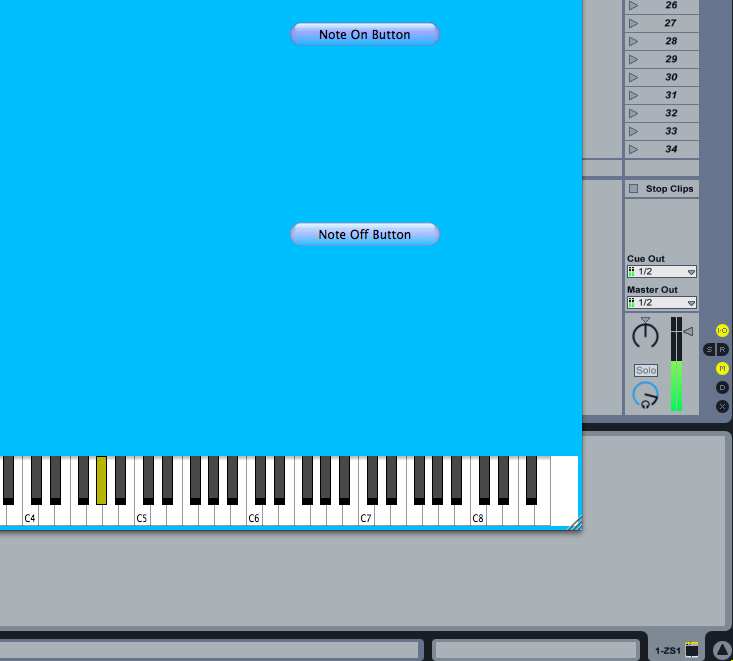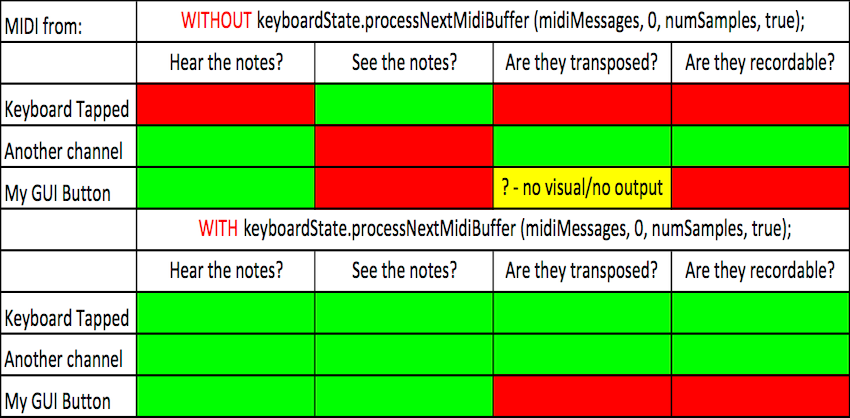Hello,
This may be something nobody else wants to do, I’m not sure, but I have a need for buttons on my MIDI processing VST which will eventually trigger chords. Right now, to test this out, I have a simple plugin based on the Audio Demo Plugin. It transposes the MIDI passed through it by 5 semitones.
My aim at this stage is to trigger just one note, note number 80, G# in the 4th octave, which should then be transposed to 85, C# in the 5th octave. I have a button named ‘Note On Button’ which triggers:
[code]MidiBuffer chordOutput;
chordOutput.addEvent(MidiMessage::noteOn(1,80,(uint8)100),0);
AudioSampleBuffer buffer = AudioSampleBuffer (512,2);
getProcessor()->processBlock(buffer, chordOutput);[/code]
and a ‘Note Off Button’ that triggers:
[code]MidiBuffer chordOutput;
chordOutput.addEvent(MidiMessage::noteOff(1, 80),0);
AudioSampleBuffer buffer = AudioSampleBuffer (512,2);
getProcessor()->processBlock(buffer, chordOutput);[/code]
My processBlock method is like this:
[code]void ZS1AudioProcessor::processBlock (AudioSampleBuffer& buffer, MidiBuffer& midiMessages)
{
const int numSamples = buffer.getNumSamples();
int channel, dp = 0;
// Go through the incoming data, and apply our gain to it...
for (channel = 0; channel < getNumInputChannels(); ++channel)
buffer.applyGain (channel, 0, buffer.getNumSamples(), gain);
// Now pass any incoming midi messages to our keyboard state object, and let it
// add messages to the buffer if the user is clicking on the on-screen keys
//Any MIDI I play will be picked up and then transposed before passed out of the plugin.
keyboardState.processNextMidiBuffer (midiMessages, 0, numSamples, true);
// and now get the synth to process these midi events and generate its output.
synth.renderNextBlock (buffer, midiMessages, 0, numSamples);
// Apply our delay effect to the new output..
for (channel = 0; channel < getNumInputChannels(); ++channel)
{
float* channelData = buffer.getSampleData (channel);
float* delayData = delayBuffer.getSampleData (jmin (channel, delayBuffer.getNumChannels() - 1));
dp = delayPosition;
for (int i = 0; i < numSamples; ++i)
{
const float in = channelData[i];
channelData[i] += delayData[dp];
delayData[dp] = (delayData[dp] + in) * delay;
if (++dp > delayBuffer.getNumSamples())
dp = 0;
}
}
delayPosition = dp;
// In case we have more outputs than inputs, we'll clear any output
// channels that didn't contain input data, (because these aren't
// guaranteed to be empty - they may contain garbage).
for (int i = getNumInputChannels(); i < getNumOutputChannels(); ++i)
buffer.clear (i, 0, buffer.getNumSamples());
// ask the host for the current time so we can display it...
AudioPlayHead::CurrentPositionInfo newTime;
if (getPlayHead() != 0 && getPlayHead()->getCurrentPosition (newTime))
{
// Successfully got the current time from the host..
lastPosInfo = newTime;
}
else
{
// If the host fails to fill-in the current time, we'll just clear it to a default..
lastPosInfo.resetToDefault();
}
MidiBuffer output;
MidiBuffer::Iterator mid_buffer_iter(midiMessages);
MidiMessage m(0xf0);
int sample;
while(mid_buffer_iter.getNextEvent(m,sample))
{
if (m.isNoteOn()) {
const int ch = m.getChannel();
const int tnote = m.getNoteNumber() + 5;
const uint8 v = m.getVelocity();
output.addEvent(MidiMessage::noteOn(ch,tnote,v),sample);
}
else if (m.isNoteOff()) {
const int ch = m.getChannel();
const int tnote = m.getNoteNumber() + 5;
const uint8 v = m.getVelocity();
output.addEvent(MidiMessage::noteOff(ch,tnote,v),sample);
}
}
midiMessages.clear();
midiMessages = output;
}[/code]
Here’s the problem. I can see and hear the midi and audio buffers I made with the [color=#FF0000]Note On Button[/color] but [color=#FF0000]these messages are not transposed and are not output from the synth[/color]. The strange thing is that midi from pressing the Juce keyboard and MIDI passed through my VST to another channel (see image below) are both correctly transposed and output. I cannot think why my buffers should be treated any differently.
I tried also omitting the line keyboardState.processNextMidiBuffer (midiMessages, 0, numSamples, true);
Observations are summarised below:
[color=#FF0000]Without[/color] the line
keyboardState.processNextMidiBuffer (midiMessages, 0, numSamples, true); the note from my button [color=#FF0000]is audible[/color] but [color=#FF0000]doesn’t[/color] get displayed on the MIDI Keyboard. Pressing the MIDI keyboard [color=#FF0000]displays the notes[/color] but [color=#FF0000]doesn’t trigger the synth[/color]. Neither my GUI button’s note or any notes I input on the keyboard are recordable by another channel in Ableton. Lastly, the midi I pass to another channel in Live is correctly transposed and recorded. I hope this info can help somebody help me out.
It seems the buffers I created with the buttons are somehow removed in processBlock.
Maybe the problem is that I should send the Note On and Note Off with the desired gap in the same buffer, adjusting the sampleNumber accordingly?
void MidiBuffer::addEvent (const MidiMessage& m, const int sampleNumber) If this is the problem, how do I equate desired notelength with sampleNumber?
I need the button pressed in my GUI to trigger a chord that the DAW can record. How can this be achieved? Is it even possible? Jules, if you are reading can you help? If not, is there a way to ‘press the MIDI keyboard’ programatically with my button or somehow achieve the desired result?
Hoping for a solution,
Dave 



